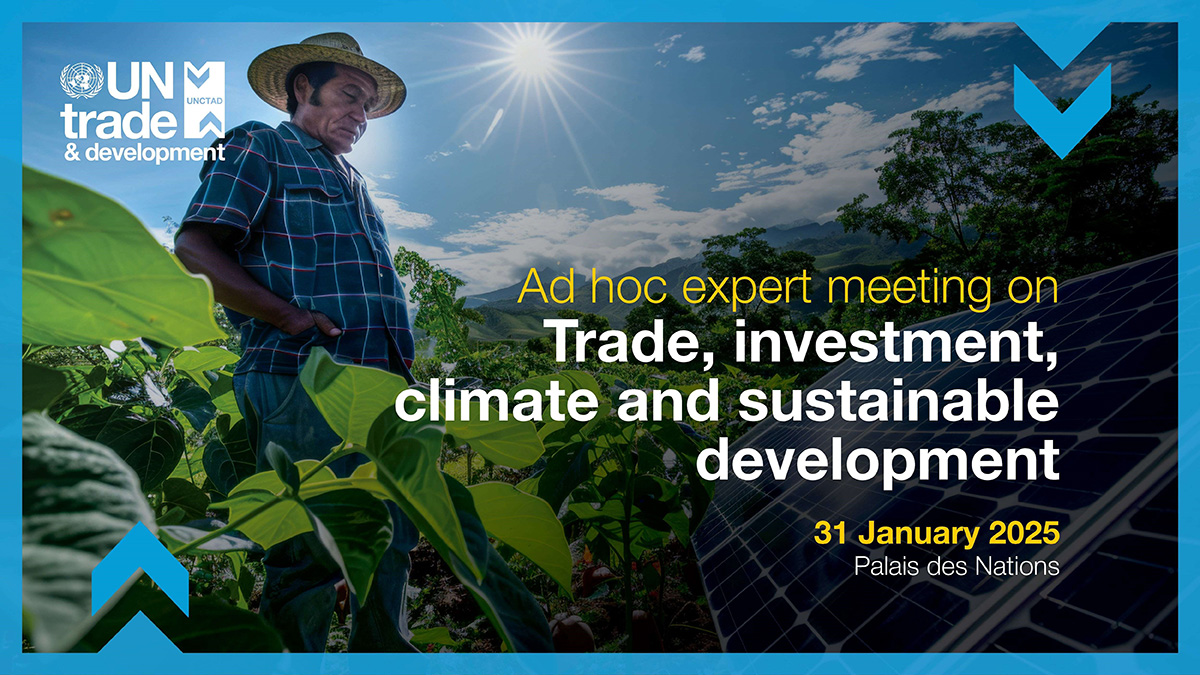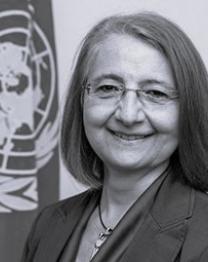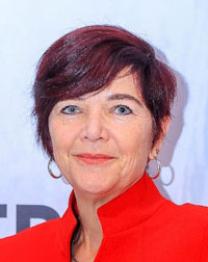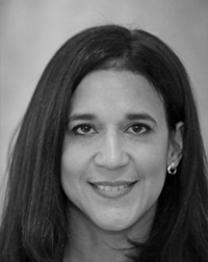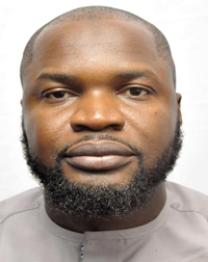The Ad hoc expert meeting on trade, investment, climate and sustainable Development will be held on 31 January 2025 in Room XXV of the Palais des Nations. It will start at 10 a.m. and will be conducted in English. The meeting will be broadcast and made accessible to all registered participants.
Background and objectives of the meeting
The Paris Agreement requires Parties to prepare, communicate, and update successive nationally determined contributions (NDCs) every five years, aiming for the highest possible ambition to meet its goals and those of the United Nations Framework Convention on Climate Change (UNFCCC) (UNFCCC, 2015). NDCs embody each country’s commitment to reducing emissions and adapting to climate impacts.
The first global stocktake under the Paris Agreement, concluded in December 2023 at the United Nations Climate Change Conference (COP28), noted significant progress towards the Paris Agreement goals, albeit largely insufficient. It called for a comprehensive transformation across all sectors, essential to lower emissions, strengthen resilience, and mobilize resources in a just and sustainable way to accelerate and amplify efforts to meet the agreed goals (UNFCCC, 2024).
As countries prepare their third round of NDCs (NDCs 3.0) before COP30 in 2025, countries are encouraged to realign global emissions with climate goals with ambitious, economy-wide emissions reduction targets across all sectors and greenhouse gases, considering each country’s unique circumstances and shared but differentiated responsibilities based on individual capabilities (UNFCCC, 2015).
Trade and Investment are key means to accelerate the implementation of climate goals, contributing to just transitions and offering sustainable development and trade opportunities. Trade can enhance access to the energy-efficient goods and technologies needed for climate change mitigation and adaptation. Sustainable trade practices can open new markets, create decent jobs, and drive innovation.
Investment supports the deployment of renewable energy. However, UN Trade and Development (UNCTAD) research shows that only over a quarter of developing countries’ NDCs include detailed investment planning and fully utilize trade-related measures. The stakes are particularly high for developing countries where environmental degradation and climate change exacerbate poverty and undermine development gains.
Against this background, UNCTAD will introduce draft guides for consultation for policymakers to mainstream trade and investment policies to advance national climate and sustainable development plans, including NDCs, and take advantage of new business and trade opportunities. The Guidelines are part of UNCTAD's contribution to the COP29 Presidency Initiative: Baku Initiative on Climate Finance, Investment and Trade Dialogue (BICFIT).
Participation
This session is open to all member States of UNCTAD. Other organizations, including specialized agencies, intergovernmental bodies and non-governmental organizations in the general and special categories, as well as academia and the private sector, may participate as observers.
Registration
Online registration is mandatory for all those wishing to attend the meeting.
Logistics
The session will be held with physical participation in room XXV of the Palais des Nations.
The link to listen live will be sent to registered participants, at the email address used for registration, one hour before the start of the session.
Luz Maria de la Mora is the Director of UNCTAD's Division on International Trade and Commodities. As a former Vice-Minister for International Trade and decades of government and private sector positions, Ms. de la Mora developed a career in international trade policy, negotiation, operations, and trade promotion.
During her tenure as Vice-Minister for International Trade of Mexico from 2018 to 2022, Ms. de la Mora led Mexico's trade and investment policy, overseeing fourteen free trade agreements with 51 countries. To bolster Mexico's development, she steered discussions in the World Trade Organization, the United States-Mexico-Canada Trade Agreement, Comprehensive and Progressive Agreement for Trans-Pacific Partnership, and Pacific Alliance, among others. She also coordinated policy dialogues and handled private sector consultations.
Ms. de la Mora holds a PhD in Political Science from Yale University, USA, a Master's degree in International Affairs from Carleton University, Canada, and a Bachelor's degree in International Relations from El Colegio de México, Mexico.
She is fluent in English and Spanish, and proficient in French.
Chantal Line Carpentier joined UN Trade and Development (UNCTAD)'s Division on International Trade and Commodities (DITC) in 2014, after serving as Chief, UNCTAD New York Office of the Secretary-General. She brings to the Branch over 25 years of work experience in international trade, and environmental and agro-economics.
Prior to working with UNCTAD, she supported the Commission on Sustainable Development and served as Major Groups (of non-State actors) coordinator for the UN Rio+20 Conference and the SDGs negotiations at the United Nations Department of Economic and Social Affairs (UNDESA). She also supported the sustainable consumption and production and sustainable agriculture negotiations.
As Head of the North American Free Trade Agreement Commission for Environmental Cooperations, she lead work on the nexus of environment, economy, and trade. She also served as Agro-environmental Policy Analyst for Winrock International, and post-Doctoral fellow/Brazil office manager for the International Food Policy Research Institute.
She has an extensive list of publications on sustainable agriculture, trade and environment, sustainable consumption and production, financing for sustainable development, stakeholder engagement, global value chains, micro, small and medium enterprises, and economic empowerment of women.
She obtained a PhD. in Agro-Environmental Economics from Virginia Technology and MSc. and BSc. from McGill University.
David Vivas Eugui is Chief of Ocean and Circular Economy Unit, a.i., Trade, Environment, Climate Change and Sustainable Development Branch, at UNCTAD.
Previously, he was a Senior Economic Affairs Officer in UNCTAD’s Trade Negotiations and Commercial Diplomacy Branch, Deputy Programmes Director at the International Centre for Trade and Sustainable Development (ICTSD), Senior Attorney at the Center for International Environmental Law (CIEL), Attaché for Legal Affairs at the Mission of Venezuela to the World Trade Organization (WTO) and Staff Attorney at the Venezuelan Institute of Foreign Trade. David is an international expert with more than 20 years of experience on legal and economic issues.
He has worked as an advisor and consultant for various institutions, international and national organizations and has lectured on intellectual property, trade, oceans economy and environmental law at the University of Strasbourg (CEIPI), Universidad de Buenos Aires (Argentina), Universidad Javeriana (Colombia), Maastricht University (the Netherlands), WIPO Distant Learning Academy, and University of Business and International Studies (Switzerland).
He holds a JD from the Universidad Catolica Andres Bello, an LLM from Georgetown University and a Master in Transnational Business from the Universidad Externado de Colombia.
Dr. Amelia U. Santos-Paulino is Chief of the Investment Issues at UNCTAD’s Division on Investment and Enterprise.
Previously, she was a Senior Economist at UNCTAD’s Africa, Least Developed Countries and Special Programmes Division. Before joining UNCTAD, she was Research Fellow and Project Director in the United Nations University’s World Institute for Development Economics Research (UNU-WIDER) in Helsinki, Professorial Research Fellow in the University of Sussex’s Institute of Development Studies, and Senior Research Economist in the Central Bank of the Dominican Republic.
She served as Senior Adviser of the Dominican Republic’s Government on International Trade and Investment for the negotiations of the US-DR-CAFTA Free Trade Agreement, amongst other full-time posts within the civil service and academia of the Dominican Republic. She has also held visiting posts at the University of California, Davis, the Graduate Institute of International and Development Studies in Geneva, Fudan University in Shanghai, and the Asian Development Bank Institute in Tokyo.
Her work has been published in journals including the Economic Journal, Cambridge Journal of Economics, and World Development, and has also edited books published by Oxford University Press and Cambridge University Press.
She holds PhD and MA degrees in Economics from the University of Kent in the UK.
Malick Kane has over ten years of experience coordinating projects and conducting research in the areas of green exports, climate change, and Non-Tariff Measures (NTMs). He has contributed to various publications on trade and climate change and is currently leading the implementation of regional projects aimed at promoting intra-African value chain development and climate resilience in West and Central Africa. In addition to his project management and research work, he is actively involved in developing and delivering both face-to-face and online training programs.
Malick joined UNCTAD in 2012 and is currently a member of UNCTAD’s Trade and Environment Branch. He also works closely with UNCTAD’s Trade Analysis Branch to which he belonged for the last 3 years. Before joining UNCTAD, he worked at UNITAR on environmental governance, green economy, and climate change.
He holds a Degree of Advanced Studies in Management and Analysis of Public Policies from the University of Geneva, Switzerland, and is also a graduate in Public Law and Political Science from the University of Toulouse, France.
Mr. Omar Badjie has been working for the Government of The Gambia since 2007 and for the ministry for over 13 years.
Mr Badjie has overseen the development of several policies and strategies in The Gambia notably the industrial, trade, investment and entrepreneurships policy. Over the years, he extensively represented The Gambia at various forum as a negotiator, expert or lead delegate. Mr. Badjie has an extensive experience of working with UNCTAD in their efforts to support The Gambia especially on the investment reforms – IPR, the review and update of the Investment Promotion Act, green value chain strategies for MSME integration into AfCFTA and the development of the entrepreneurship policy.
He also serves as the National Project Coordinator of the UNDP’s support to entrepreneurship and private sector development and currently serving as the National Coordinator of the UNIDO-Gambia country program.
He holds a Bachelors degree from the University of The Gambia specializing in economics, and a Masters degree in economic policy from The Australian National University.
Dr. Manal Shehabi is an applied development economist with recognized expertise in the economics-energy-climate nexus and policies in resource developing economies. She is Senior Research Fellow at Oxford’s Institute for New Economic Thinking at the Oxford Martin School, Seminar Leader for Economics at Blavatnik School of Government, the University of Oxford. She is Member of the Institute for Energy, Climate, and Disaster Solutions at the Australian National University; Research Fellow (elected) of the Economic Research Forum; and Founding Director of SHEER Research & Advisory. She is a consultant to the International Energy Agency and an expert of the UNFCCC on just energy transitions, response measures, and economic diversification.
Her interdisciplinary work offers important contributions to the understanding and modeling of diversification, just transitions, fiscal space, people in vulnerable situations, energy and climate policy alternatives in developing countries and petrostates.
Her research has global impact on debates for solutions for energy, climate, and economic challenges. She addressed by invitation the 1st High-Level Ministerial Roundtable on Just Transition at COP28 to help ministers and delegates with the Just Transition Work Programme (JTWP) (operationalized at COP28). She addressed by invitation the 1st JTWP Dialogue at the SB60 2024 Bonn Climate Conference along with the Chair of the IPCC. Her economic models are used for policymaking and she reviewed and advised on hydrogen and green industrial policies.
She was also lead author of various policy briefs/reports (T7 (G7), T20 (G20), UNFCCC, UNICEF). She co-authored, among others, the IPCC Special Report on the Ocean, Kuwait Energy Outlook 2020, a UNFCCC report on modeling impacts of response measures in developing countries (presented at COP26), and a roadmap on cement decarbonization in Saudi Arabia. She advised PWYP and the Open Society Foundation on just energy transition in the MENA region. She is an Advisory Board Member for the EFI-KAPSARC energy transitions research project and the Natural Resources Governance Institute MENA platform. She taught undergraduate and graduate university courses and conducted capacity building for policymakers in developing countries in four continents.
Having lived in four continents, she gained professional experiences in public policy and industry working on projects spanning six continents. She regularly advises policy makers, firms, and international institutions. She is cited and appears in media in different languages.
Dr. Shehabi received various honors, grants, and awards. A polyglot, she is fluent in English, Arabic, French, proficient in Spanish, and speak intermediate Mandarin Chinese and basic Italian and Hebrew.

